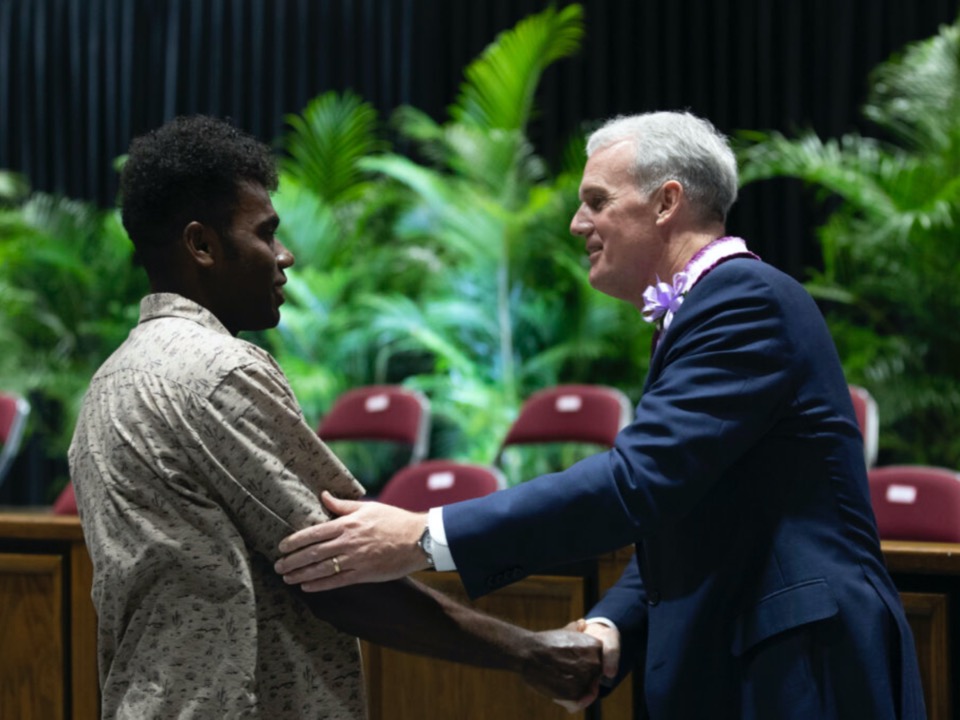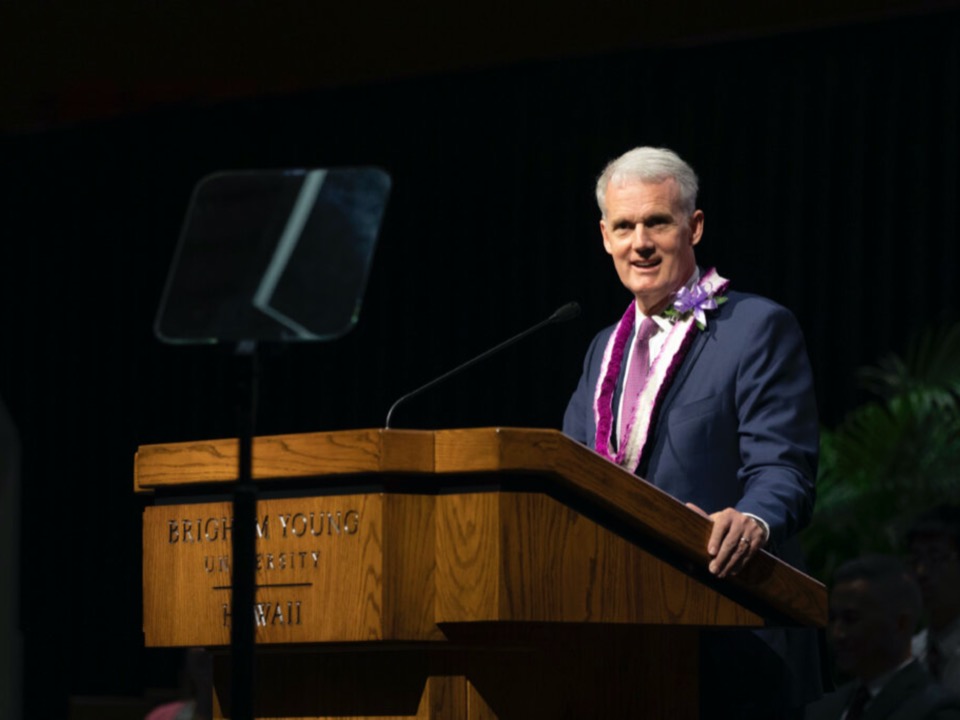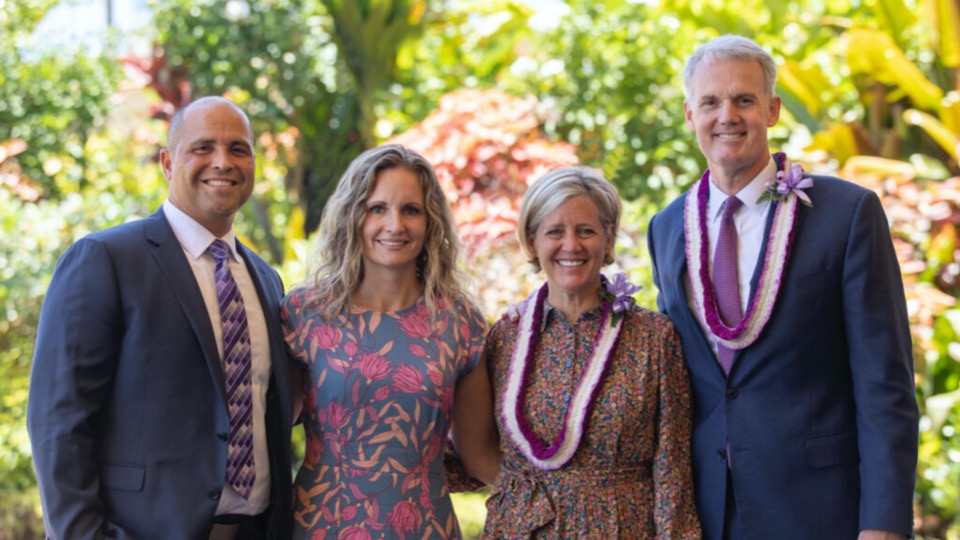
This story appears here courtesy of TheChurchNews.com. It is not for use by other media.
By Mary Richards, Church News
Focusing on one’s individual identity as a child of God and disciple of Jesus Christ leads to a “joyful and enduring” belonging as well as an increased ability to reach our divine potential, Elder John C. Pingree Jr. taught in a BYU–Hawaii devotional.
When speaking on Tuesday, May 24, the General Authority Seventy extended three invitations that he said “will help us gain a joyful and enduring sense of identity and belonging and enable us to reach our divine potential.”
First: Prioritize Divine Identity
“I invite us to prioritize our divine identity as children of God,” Elder Pingree said. “This means we base our self-worth on our divine parentage. We seek to build our relationship with God through prayer and scripture study, Sabbath-day observance and temple worship, and any other activity that brings the Holy Spirit into our lives and strengthens our connection to Him.”
Elder Pingree said the most ennobling of all doctrine is the knowledge that people are children of loving Heavenly Parents and have the potential to be like Them. God’s plan of happiness shows His love for His children and their immense value and worth to Him.

Elder Pingree spoke about visiting a small branch in a rural part of Mexico, where he sat on a plastic chair on a cement floor in a small, rented warehouse for sacrament meeting.
As he looked at the others there, he wondered what message Heavenly Father wanted him to share with them. “While I prayed, the Spirit communicated to me the following words: ‘Tell them I know them and I love them. Tell them I weep when they cry, and I rejoice when they are happy. Tell them I hear their prayers and am answering in a way best for them.’”
He then bore that same witness with the BYU–Hawaii students: “God knows you and loves you. He weeps when you cry, and He rejoices when you are happy. He hears your prayers and answers them in the way He knows best.”
Elder Pingree shared how mortality can divert someone from their divine identity (for example, focusing too much on genetic and environmental differences — or labeling, segmenting and categorizing by different characteristics).

“When we forget our core identity as God’s children, we can begin to fear, distrust or feel superior to those different than we are,” he said. “These attitudes often lead to division, discrimination and even destruction.”
But in the context of divine heritage, diversity provides beauty and richness to life, allowing people to recognize everyone as brothers and sisters and respect and learn from one another, he said.
Mortal trials can be another obstacle to sensing a divine identity. But remembering divine identity brings a broader, more eternal perspective.
“I promise that as we seek Him, He will send compensating blessings to those of us enduring these types of trials,” said Elder Pingree.
Sin is also a challenge of mortality that separates people from their connection to God. But sins should not define people. Trust in God’s plan will help us to overcome sin and return to live in His presence, taught Elder Pingree.
Second: Accept Christ as the Savior
“I invite us to accept Christ as our Savior and to place our discipleship to Him above other considerations,” Elder Pingree said. “This means that we take His name upon us and that we desire to be known as His followers. We seek to access His forgiveness and His strength daily. We make and keep sacred our covenants. We strive to become like Him.”
Elder Pingree said Satan tries to convince people that they are not worthy of Christ’s help or attention, or that Christ has lost interest in them and that they no longer belong.
“Nothing could be farther from the truth,” he said. “Christ is always willing to help us. We belong to Him, and He yearns for us to come to Him. In His own words, the Savior promises, ‘Come unto me with full purpose of heart, and I will receive you’” (3 Nephi 18:32).
To come to Christ with full purpose of heart, accept Him as your Savior and Redeemer. Then, make and keep sacred covenants with God.

Making and keeping covenants binds God’s children to Him and His Son but also connects them with one another, taught Elder Pingree. He shared how while attending sacrament meeting in Costa Rica, he was overwhelmed with God’s love for the other fellow covenant keepers in the room.
“When we make and strive to keep sacred covenants with God, we begin to experience a sense of belonging greater than can be achieved through affiliation with any earthly or temporal group,” Elder Pingree said.
Third: Engage in God’s Work
“I invite us to engage in God’s work by helping others come to Christ and gain eternal life,” said Elder Pingree. “This means we help others see their divine identity and feel a sense of belonging. We openly share the joy we find in Jesus Christ and His gospel. We strive to help others make and keep sacred covenants with God. We seek God’s guidance to know who we can bless and how to do so.”
Making and keeping covenants not only helps someone belong to God, but also enables them with the power to become like Him, by practicing thinking, behaving and loving as He does.
Daily repentance enables someone to contribute to God’s work. And joining God in His work involves using our time, spiritual gifts and agency in the service of others.
“To be effective in His work, we need to turn outward and learn to put God first and often place the needs of others ahead of our own,” Elder Pingree said.
Elder Pingree said it would be useful to take a periodic inventory to see whether recreation, social media and relaxation might be consuming too much time that could be used to do more meaningful things.
“While His work may require us to overcome some fear and discomfort, He will endow us with the strength and give us the support to accomplish what He expects of us,” Elder Pingree said.
While engaging in God’s work, each person transcends their place from belonging to a group to becoming a real partner with God and Jesus Christ.

A Promise
Elder Pingree promised that prioritizing our relationship with God and discipleship to Jesus Christ will lead to a joyful and enduring sense of identity and belonging and will ultimately help lead to us reach our divine potential.
“God is our loving Father, and His Son, Jesus Christ, is our Savior and Redeemer,” he said. “As we prioritize our divine identity and choose to belong to Them, we will ultimately become one with Them.”
Copyright 2022 Deseret News Publishing Company.